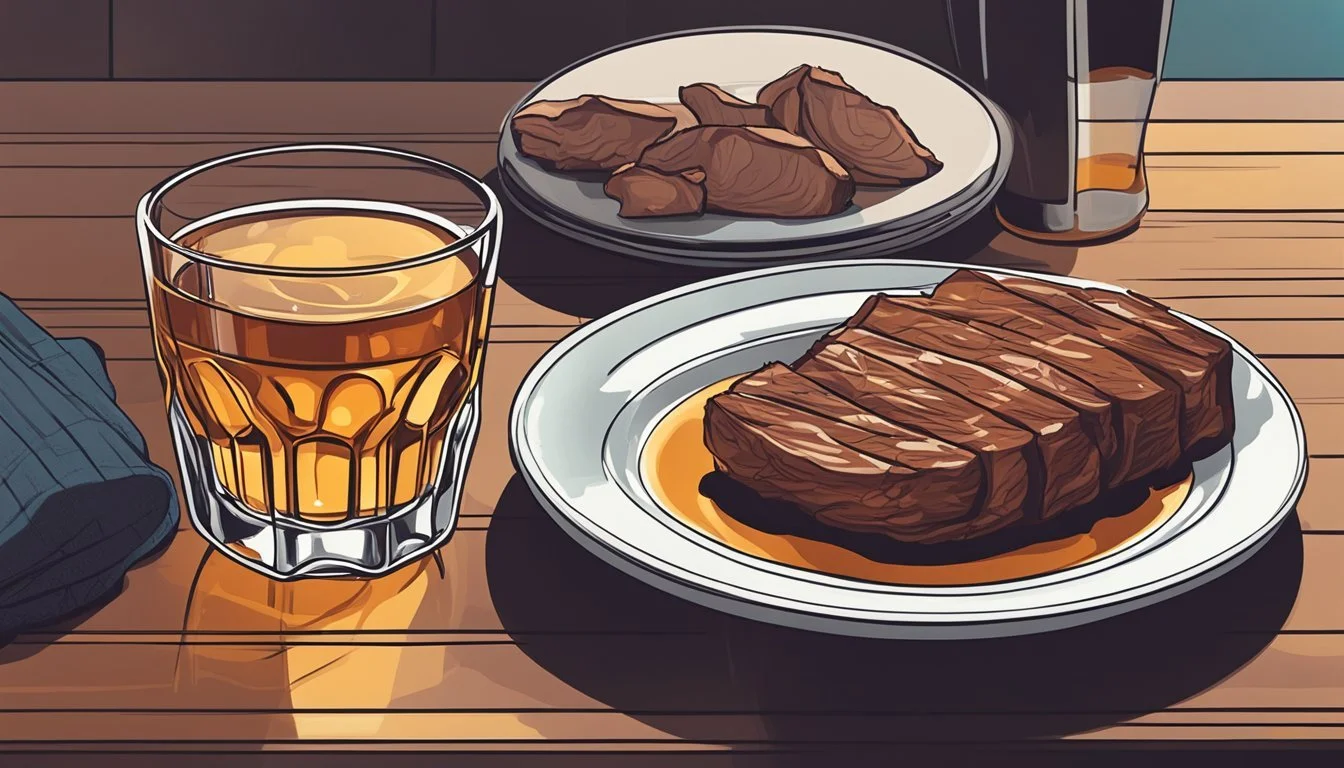Can You Drink Whiskey on Carnivore Diet
Exploring Alcohol Compatibility
The carnivore diet, a regimen centered around the consumption of meat and animal products and the exclusion of plant-based foods, has gained attention for its purported health benefits. Enthusiasts claim improvements in weight management, mental clarity, and reduction of inflammation, among other benefits. However, questions arise about the compatibility of certain indulgences, such as alcohol, within this dietary framework. Alcohol, in its many forms, typically originates from plant-based sources, calling into question its place in a diet that exclusively celebrates animal-based nutrition.
Whiskey, a popular distilled alcohol, often sparks debate within the carnivore community. While it is commonly accepted that the fermentation and distillation process of whiskey involves grains—a non-carnivore diet ingredient—some argue that the distillation process could potentially remove these elements, leaving the final product more acceptable for consumption. This leads to contrasting viewpoints on whether whiskey can be aligned with the principles of a strict carnivore diet.
Evaluating the consumption of whiskey within the context of the carnivore diet requires an understanding of both the diet's strict guidelines and the process by which whiskey is made. One must consider how the body processes alcohol and whether the potential lack of certain plant-derived components in whiskey post-distillation makes it an allowable exception. The debate centers around not just nutritional purism but also the practical implications of alcohol consumption for those diligently following the carnivore diet.
What Is the Carnivore Diet?
The carnivore diet is a restrictive regimen that advocates consuming primarily animal products. It's a diet that consists mainly of meats, and it often excludes all other food groups, which positions it at one extreme of dietary patterns.
Key Characteristics of the Carnivore Diet:
High in Protein and Fats: It is rich in these macronutrients as it emphasizes the consumption of animal flesh and fat.
Low in Carbohydrates: Practically devoid of carbohydrates since it eliminates plant-based foods.
No Fiber: Since fiber is generally obtained from plant-based foods, it is absent on this diet.
Ketosis Potential: Due to the low carbohydrate intake, the diet may lead to a metabolic state called ketosis where the body uses fat as the primary energy source.
Exclusion of Plant-Based Foods: It removes all grains, fruits, vegetables, nuts, and seeds -- anything that is plant-derived.
Restricted Processed Foods: Ideally, processed foods are also removed, although some interpretations allow for processed animal products.
This eating pattern is centered on the belief that human ancestors thrived on a similar diet, and it often claims to provide various health benefits. However, the diet is controversial as it goes against the commonly recommended balanced diet which includes a variety of foods, including carbohydrates and fiber. Critics often point out the potential nutritional deficiencies and long-term health implications due to the exclusion of plant-based foods.
Alcohol Consumption and Its Effects
When discussing whiskey consumption on the carnivore diet, it's essential to consider how the body processes alcohol, its impact on liver function and associated health risks, and the influence on weight loss and ketosis.
Understanding Alcohol Metabolism
Alcohol is metabolized by the liver, where it is converted to acetaldehyde, a toxic substance later broken down into acetate. This process consumes energy and generates calories. On the carnivore diet, where carbohydrate intake is negligible, the liver may metabolize alcohol slightly differently, potentially impacting its effect on the body. Individuals on this diet may experience quicker absorption and potentially more immediate intoxication as carbohydrates normally slow down this process.
Impact on Liver Function and Health Risks
The body regards alcohol as a toxin, and excessive consumption places a significant burden on the liver, which can lead to liver disease over time. While metabolizing alcohol, the liver cannot perform its other functions optimally. This increases health risks concerning liver function and can contribute to the development of liver-related health problems. Therefore, moderating alcohol intake is crucial, even for whisky, which is low in carbohydrates.
Alcohol’s Effect on Weight Loss and Ketosis
Alcohol contains approximately 7 calories per gram, providing a source of energy without nutritional benefits. These 'empty calories' can impede weight loss efforts since the body prefers to burn alcohol for energy before fat. For those on a carnivore diet pursuing ketosis, alcohol can interrupt this fat-burning state because the liver prioritizes breaking down alcohol over producing ketones, the hallmark of the ketogenic state. Thus, frequent alcohol consumption may hinder progress toward weight loss goals and ketosis.
Is Whiskey Compliant with the Carnivore Diet?
When considering a carnivore diet, it is important to scrutinize the suitability of all beverages, including whiskey, based on their carbohydrate content and production methods.
Carbohydrate Content in Whiskey
Whiskey is an alcoholic beverage with a minimal carbohydrate content. The primary source of carbohydrates in alcoholic beverages is sugar, which whiskey lacks after the distillation process. Although whiskey is derived from fermenting grains — which contain carbohydrates — the distillation effectively eliminates these sugars. As a result, most whiskey is nearly free of carbohydrates.
Whiskey's Distillation and Ingredients
The distillation process used to make whiskey involves heating a fermented grain mash—common grains include barley, corn, rye, and wheat. This process concentrates the alcohol and removes most, if not all, other components, including gluten and carbohydrates. The remaining fluid, whiskey, is considered gluten-free and low in carb content. This aligns with the carnivore diet's preference for foods and drinks that are low in or devoid of plant-based substances.
Drinking in Moderation
While it's technically permissible for individuals on a carnivore diet to consume whiskey, this should be approached with caution and within strict moderation to avoid disrupting their dietary regimen.
Defining Moderation for Carnivore Dieters
Moderation for carnivore dieters involves consuming alcohol in such a way that it doesn't interfere with the core principles of their diet. This means focusing on:
Quantity: Men should limit themselves to a maximum of two drinks per day, while women should limit themselves to one.
Frequency: Occasional consumption, rather than daily.
Beverage choice: Opting for drinks that are lower in carbohydrates, such as straight spirits like whiskey, which have no carbs post-distillation.
Potential Benefits and Downsides
Benefits of moderate alcohol consumption within a carnivore diet may include:
Social Enjoyment: The ability to partake in social rituals without derailing diet goals.
Relaxation: Alcohol, in moderation, can contribute to relaxation.
Downsides include but are not limited to:
Energy and Focus: Alcohol may negatively affect energy levels and focus, even when consumed moderately.
Digestion and Metabolism: Alcohol can potentially disrupt normal digestion and metabolism, which are vital for success on the carnivore diet.
Sleep Quality: Even small amounts of alcohol can impair sleep quality.
Mental Health: Alcohol can affect mental health, so those with issues related to mood or addiction should be particularly cautious.
Addiction: Habitual drinking poses a risk of developing an addiction, which is contrary to maintaining any dietary discipline.
Alcohol Alternatives and Hydration
When adhering to a carnivore diet and seeking alternatives to alcohol, focusing on hydration and exploring non-alcoholic beverage options becomes essential.
Healthy Hydration Practices
Hydration is a cornerstone of health on a carnivore diet, and water is the quintessential choice for maintaining hydration. Individuals should aim to consume an adequate volume of water daily, adjusting intake based on activity level, climate, and individual needs. Minerals and electrolytes are critical for proper hydration, and they can be supplemented through bone broth, which provides both nourishment and hydration.
For those looking for variety, spring water and sparkling water offer different sensory experiences while still aligning with the carnivore diet's principles. Monitoring hydration levels is important, and one may do so by observing the frequency of urination and the color of their urine, aiming for a light straw color.
Non-Alcoholic Beverage Options
While traditional herbal teas and coffees are derived from plants and are not strictly carnivore, some individuals on the diet may choose to consume them in moderation. Here are examples of acceptable non-alcoholic beverages:
Bone broth: Rich in nutrients and minerals, it replenishes electrolytes.
Sparkling water: A fizzy alternative to still water, free from sugars and additives.
Tea and coffee: While not animal-based, they are often considered acceptable in moderation for their low to zero carbohydrate content.
When selecting non-alcoholic beverages, it's crucial to read labels to ensure they do not contain sugars, artificial sweeteners, or other non-carnivore ingredients.
Nutrient Absorption and Alcohol
When considering the carnivore diet, one must assess how alcohol, such as whiskey, impacts nutrient absorption. Alcohol can have various effects on the body’s ability to digest and utilize nutrients effectively.
Protein and Fats: The carnivore diet is high in these macronutrients. Alcohol can slow down the digestion of protein and fats, which are essential for maintaining muscle and overall health. This can be a concern, as it may hinder the body's ability to repair and build new tissues.
Vitamins and Minerals: The carnivore diet provides key nutrients like vitamin A and zinc, which support immune function. However, alcohol consumption may alter their absorption. It can:
Decrease enzyme effectiveness, impeding vitamin A conversion and possibly leading to deficiencies.
Impair zinc absorption, which is crucial for wound healing and immune system maintenance.
When it comes to vitamin A and zinc, online shopping is the way to go!
Alcohol Impact on Nutrients
Enzyme Inhibition:
Nutrient Affected: Vitamin A
Potential Effect: Reduced conversion and absorption
Absorption Interference:
Nutrient Affected: Zinc
Potential Effect: Weakened immune system
For individuals on a carnivore diet, understanding these interactions is crucial. While moderation may allow for occasional alcohol consumption, the frequency and quantity should be carefully considered to prevent adverse effects on nutrient absorption, essential for overall health.
Social Aspects and Lifestyle Factors
Adhering to a carnivore diet has unique challenges when it involves social situations and personal discipline. This section explores how to navigate social gatherings and manage cravings within the realm of a diet focused on meat, cheese, eggs, and other animal products.
Navigating Social Gatherings on the Carnivore Diet
When attending social events, individuals on the carnivore diet might find it challenging to adhere to their dietary restrictions due to the variety of foods typically available. However, planning ahead can help. They should communicate with hosts beforehand to inquire about the availability of carnivore-friendly options such as keto meats, cheese, or fish. If options are limited, they can consider bringing their own food to ensure they can participate without derailing from their diet.
Pre-event Planning:
Confirm meat-based options will be available.
Offer to bring a carnivore-approved dish.
At the Event:
Focus on socializing rather than eating.
Choose drinks like dry wines or spirits that are lower in carbohydrates, if alcohol is desired.
Maintaining Discipline and Managing Cravings
Discipline is crucial for anyone following a strict eating plan, and cravings for non-carnivore foods can challenge one's willpower. Individuals should recognize that cravings are natural but controllable. They can manage these cravings by ensuring they are satisfied with nutrient-dense meat-based meals and by having readily available carnivore diet-friendly snacks like jerky or boiled eggs. Consistent reminders of their health goals can help maintain discipline in the face of temptations.
Strategies for Discipline:
Prepare satisfying meals with a variety of permitted animal products.
Keep convenient, compliant snacks on hand.
Dealing with Cravings:
Distract oneself with activities or social interactions.
Remind oneself of the diet's health benefits to reinforce willpower.
Potential Psychological Effects of Drinking
Drinking alcohol, such as whiskey, on a carnivore diet can have intricate psychological effects due to its interaction with mental health and the central nervous system.
Understanding Alcohol’s Impact on Mental Health
Alcohol affects the central nervous system and can temporarily alter mood, behavior, and neuropsychological functioning. Intoxication can lead to a temporary feeling of euphoria, as alcohol stimulates the brain's reward centers. However, these effects are often short-lived, and regular consumption can lead to an altered mental state with potential negative outcomes for mental health.
Alcohol as a Depressant and Its Relationship with Anxiety and Depression
As a depressant, alcohol slows down brain function and can exacerbate symptoms of anxiety and depression. It may initially seem to relieve stress or anxiety, but extensive consumption can impair the neurotransmitter systems that regulate mood, increasing the risk of developing depressive disorders. Its impact is especially noteworthy as it may alter the appetite and sleep patterns, which are critical factors in maintaining one's mental balance.
Managing the Risk of Addiction and Dependency
They need to be cautious about the risk of addiction and dependency with alcohol consumption, which can be a significant concern. Consistent use of alcohol can lead to tolerance and dependency due to its reinforcing effects on the brain's reward system. Recognizing the early warning signs of dependency, such as a strong urge to drink or drinking in larger amounts over time, is crucial for one's mental and physical health.
FAQs About Alcohol and the Carnivore Diet
Can I consume whiskey on a carnivore diet?
Whiskey, a type of spirit, is essentially low in carbohydrates. However, strict adherents to the carnivore diet often avoid it since it's not an animal product.
What alcoholic beverages are considered low-carb?
Spirits like gin, tequila, and vodka are generally low in carbs.
Dry wines have fewer carbs than sweet wines.
Light beers are lower in carbs than regular or craft beers.
Is moderation important when consuming alcohol on the carnivore diet?
Yes, moderation is key. Men should consider limiting to two drinks per day and women to one.
Can I include alcohol in the carnivore diet without breaking its principles?
Spirits are technically permissible in moderation.
Mixed drinks with sugary additives should be avoided.
Opt for straight spirits or those mixed with zero-carb mixers.
Are there any specific alcoholic drinks to avoid on the carnivore diet?
Regular beers and cocktails with high-sugar mixers are not in line with the low-carb principle of the carnivore diet. Choose drinks with fewer additives and lower carbohydrate content.









